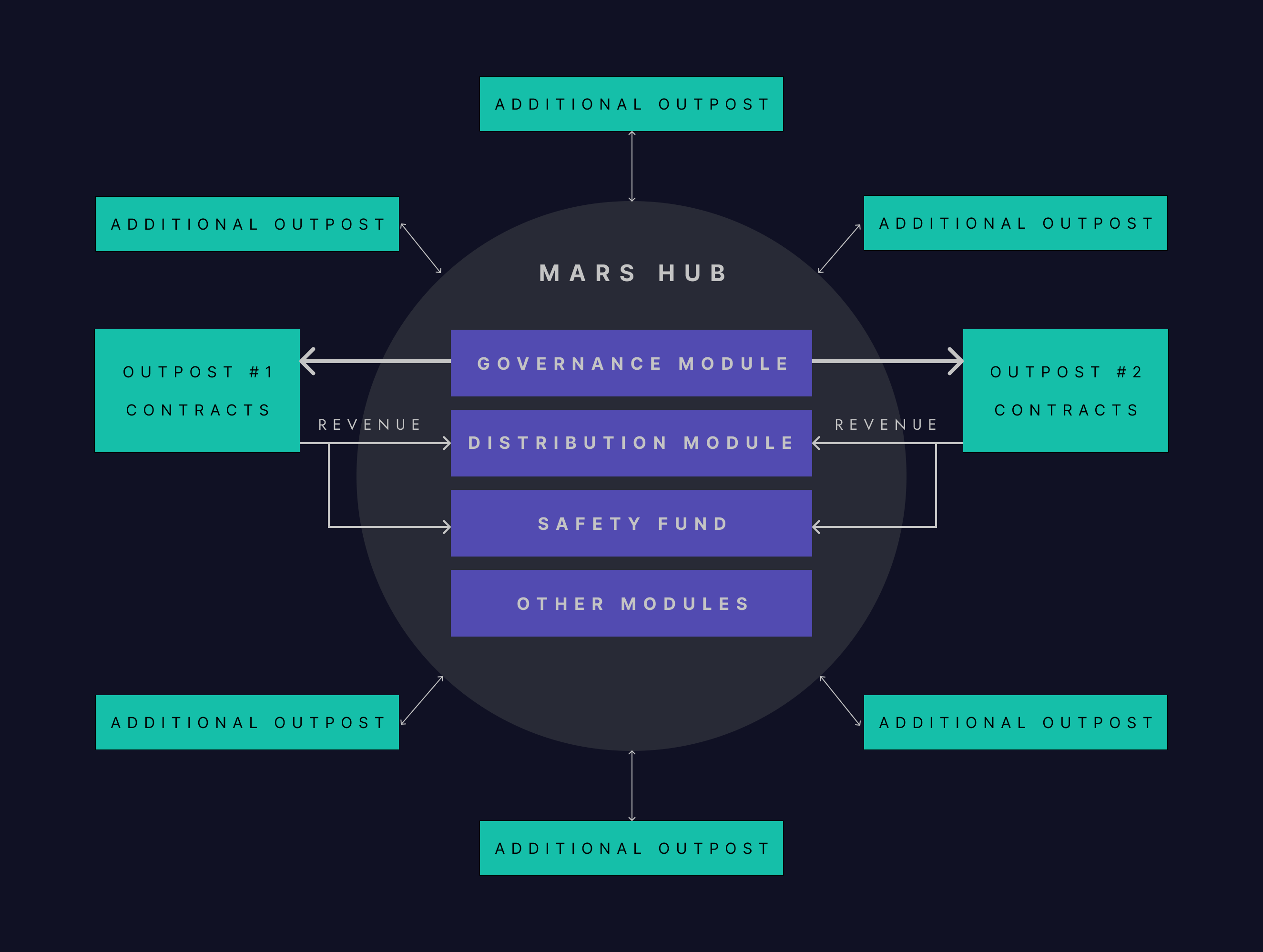Mars Hub Architecture
Mars Hub is a new Cosmos-SDK Layer 1 (L1) appchain. Mars Hub coordinates and governs Mars Protocol smart contract code deployments (Outposts) across numerous blockchains. As its name implies, Mars Hub will be the central or organising “hub” in a “hub and spoke” design. Other L1 chains that Mars Hub interacts with operate as “spokes.” On Mars Hub, $MARS holders stake, vote and delegate their $MARS in the Martian Council and use $MARS to securely build and validate the Mars blockchain. The Mars Hub also receives fees from Outposts, and distributes fees to the Martian Council as a reward for its validation, staking and governance work.
This unique architecture enables:
- The operation of Mars outposts on multiple blockchains
- A neutral location (specifically, Mars Hub) for cross-chain governance and treasury
- A source of truth for MARS tokens
- Staking reward distributions

Bespoke Modules at Launch
Appchains using the Cosmos SDK are constructed by aggregating the configurable and interoperable modules listed here. Mars Hub is designed with three additional custom modules:
Customgov: A wrapper module around the vanilla governance module that comes as standard within the Cosmos SDK. This wrapper inherits most of the standard governance module but implements alternative vote tallying logic. That is, tokens locked in a vesting contract contribute towards that token-holders’ voting power. This module has been built to account for the builders’ token allocation and to facilitate their participation in governance.Incentives: A module that facilitates the incentivisation of staking on Mars Hub. Incentivisation is defined via linear unlocking schedules. Tokens associated with a schedule are sourced from the community pool and therefore incentives can only be launched after a successful governance action. It should be noted that a schedule can consist of multiple tokens, not only MARS.Safetyfund: A module tasked solely with receiving a fraction of an Outpost’s revenues denominated in stablecoins. See the section “Safety Fund”, below, for a breakdown in the use of the Outpost’s revenue. Spending the funds in the safetyfund can only be done so via a successful governance proposal.
Running Smart Contracts on Mars Hub
Built on Cosmos SDK, v0.45, Mars Hub is expected to launch with support for CosmWasm smart contracts written in Rust. The smart contract virtual machine (VM) is implemented as a portable module that can be plugged into any blockchain built using the Cosmos SDK. This will allow Mars Hub to facilitate the MARS token claim procedure and token vesting schedule for its builders. CW3 multisig contracts and relevant frontend webapps, including Apollo Safe’s multisig frontend, are also expected to be deployed onto Mars Hub.
Mars Hub’s design features a governance-permissioned version of the WASM module, where deployment and migration of smart contracts require approval by the Martian Council.
Validators
Validators will be required to produce blocks for Mars Hub. Mars Hub’s design calls for a PoS consensus mechanism native to the Cosmos SDK v0.45. This includes a permissionless validator set, which is open to participation by any entity.
Mars Hub is expected to use the validator infrastructure native to the Cosmos SDK v0.45 with slight modifications to the incentives module as noted below in “Bespoke Modules at Launch.” A testnet, testnet faucet and testnet MARS are expected to be publicly available.
Validator participation on the Mars Hub testnet and mainnet is encouraged. Validator onboarding documentation is available here.